Blake Marnell was standing in the front row, about 10 yards from Donald Trump, when the shots rang out. He watched the Secret Service pile on the former US president. “I was able to see him standing and I could see the blood on his ear,” Marnell recalls. “When he put his fist up, I remember yelling, ‘Yes! Yes! Yes!’”
Sunday marks one year since the assassination attempt on Trump at a campaign rally in Butler, Pennsylvania, and a week that changed US politics. Eight days later then-president Joe Biden, 81, dropped out of the election race amid concerns over his mental and physical decline.
The twin shocks to the system of July 2024 continue to echo. Trump’s supporters hailed his survival as proof of divine intervention. He declared in his inaugural address in January: “I was saved by God to make America great again.” He has governed with a zealous self-belief that earns comparisons with authoritarians from history.
Democrats, meanwhile, continue to wrestle the fallout of Biden’s late withdrawal. Some argue that he could have pushed on and won; most believe that he left the race too late and paved the way for Trump’s return to the White House. Younger voters accuse the party establishment of betrayal and beat the drum of generational change.
What few dispute is that the shooting of Trump was indicative of a culture of political violence that has taken hold over the past decade, with recent examples including the murder of a Minnesota politician and her husband. It also set in motion a news cycle that has barely drawn breath over the past year as the most unconventional president of modern times dominates the national consciousness.
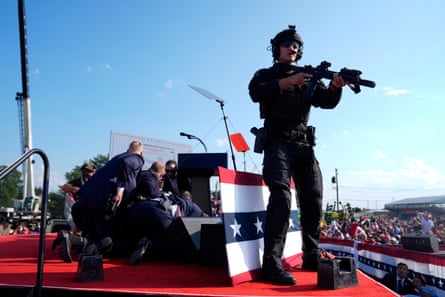
For Marnell, who lives in San Diego, California, that hot summer’s day in Butler began like dozens of the other Trump rallies he has been to before and since. He was wearing a “brick suit” that symbolises the president’s border wall and looked up at a giant screen that displayed a chart detailing US-Mexico border crossings.
Trump had his head turned to the right to review the graphic when the gunfire began and nicked his right ear. “I didn’t even recognise them as gunshots,” 60-year-old Marnell said in a phone interview. “I thought they might be firecrackers.”
For several long seconds there was pandemonium. Firefighter Corey Comperatore was killed while David Dutch and James Copenhaver were both hospitalised with injuries. Secret Service agents killed the gunman, 20-year-old Thomas Crooks, whose motives remain a mystery, and rushed on top of Trump, whose fate was initially uncertain.
“There was every range of emotion in the crowd. There was anger. There were people who turned around and were yelling at the TV cameras. There were people who were in prayer. There were people crying. There were people who were in disbelief. It was just an incredible gamut and range of reactions.”
But what happened next became the stuff of political legend. Trump rose, pumped his fist and beseeched his followers to “Fight! Fight! Fight” even as blood streaked his face. The resulting image flashed around the world and is still displayed in the West Wing and worn on T-shirts by his “Make America great again” (Maga) acolytes.
Henry Olsen, a senior fellow at the Ethics and Public Policy Center thinktank in Washington, said: “He showed courage and determination when you’d think the first thing somebody wants to do is slink away and save themselves. His response was to be the medieval chieftain who was rallying his troops round the banner and showing that he was undeterred to fight, to use his word. It was incredibly moving.”
Biden was quick to call Trump and express sympathy. On 17 July, Biden tested positive for Covid-19. On 19 July, Trump, wearing a patch on his ear, delivered a 90-minute address at the Republican national convention in Milwaukee, where some delegates wore ear patches in solidarity.
Then, on 21 July, Biden suddenly announced that he was stepping aside and would not be the Democratic nominee for president. The writing had been on the wall since his disastrous debate performance against Trump the previous month. Party leaders such as Nancy Pelosi and Chuck Schumer had urged him to withdraw. Finally, he yielded.
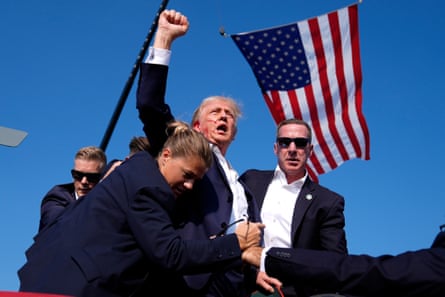
Even by the standards of the Trump era, it had been a jaw-dropping eight days. Larry Sabato, director of the Center for Politics at the University of Virginia, said: “There have been dramatic weeks and months but, in an election campaign, there’s just nothing like it in all of American history.”
Journalist Chris Whipple was working on a different project when he heard the news of Biden’s exit, “realised this was the political story of the century”, and pivoted to writing a book that would become Uncharted: How Trump Beat Biden, Harris, and the Odds in the Wildest Campaign in History.
“It created that devastating split screen between the strengths of Trump and the weakness of Biden,” Whipple said. “The image of Trump rising off that stage with blood on his cheeks and his fist in the air mouthing ‘fight, fight, fight’ was devastating in comparison to the image of Biden shortly thereafter climbing off Air Force One with Covid headed to his bunker in Rehoboth Beach, standing on those steps, looking lost and gripping the handrail.”
In their new book 2024: How Trump Retook the White House and the Democrats Lost America, journalists Josh Dawsey, Tyler Pager and Isaac Arnsdorf write how Trump’s future chief of staff, Susie Wiles, told him after the assassination attempt: “You do know this is God.” At first Trump was silent, they write, but by the next day he was telling everyone: “If anyone ever doubted there was a God, that proved there was.”
Numerous speakers at the Republican convention insisted that Trump had been spared by God so that he could pursue his mission. The Detroit pastor Lorenzo Sewell refers to it as a “millimetre miracle”.
Whipple added: “To this day the true believers think this was God’s plan and maybe – without playing armchair psychologist – it’s contributed to a kind of fearlessness in Trump that I’m not sure we saw in the first term. Some might say recklessness. It changed Trump. It changed the country.”
Conversely, the Democrats have still not recovered from the debacle of Biden’s late departure. His anointed successor, Kamala Harris, had only 107 days to campaign and ignited a burst of Democratic enthusiasm, notably at the party convention and when she debated Trump. But it was too little too late and she lost both the electoral college and the national popular vote.
Whipple commented: “It was a seismic political event and the reverberations continue to this day. His 11th-hour abdication, leaving Kamala Harris with too short a runway to mount a winning campaign, obviously is historic and there is to this day a lot of anger among Democrats about the fact that Biden should have stepped away a year earlier or more.
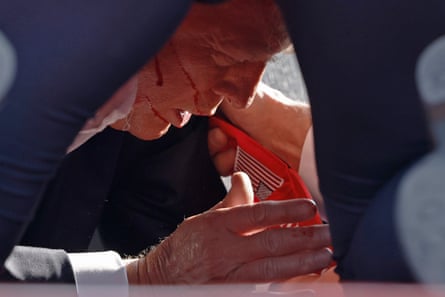
“That has real political ramifications. We’re seeing it in the popularity of Zohran Mamdani in New York and Alexandria Ocasio-Cortez and Bernie Sanders. It’s not just their message which is appealing to so many but also the fact that they’re anti-establishment. Biden and his gang have come to represent the corrupt Democratic establishment because of his last-minute abdication. You’re seeing an anti-establishment revolt.”
Biden’s determination to cling on has been the subject of Democratic hand-wringing – and several books – though he insists he has no regrets. Many in the party wish he had stepped aside after the 2022 midterm elections so it could have held an open primary contest to find an heir apparent. Now Democrats find themselves leaderless and, according to a March poll, at a record low approval rating of 29%.
Kurt Bardella, a Democratic strategist and political commentator, said: “The real fallout was the lack of a clear successor to President Biden.
“Had there been a real primary process that would have been able to unfold over the course of a year and a half, it would have weeded out the contenders and pretenders and would have put forward a ticket that, even if they ended up losing, could still have been very much part of the conversation heading into 2028. Instead, we’re starting 2028 already behind.”
How elections are won and lost is always complex. With inflation and immigration looming large, there is no guarantee that another Democratic candidate would have beaten Trump. Nor will it ever be known how determinative his made-for-TV response to the assassination attempt was. But it did have some important consequences.
Within minutes of the shooting, Elon Musk, the tech billionaire, announced his endorsement of the former president. Musk would go on to spend a record of about $280m in backing Trump and Republican candidates, then lead the president’s assault on the federal bureaucracy until their spectacular falling-out.
The Meta chief executive, Mark Zuckerberg, also praised Trump’s reaction, calling his raised fist “one of the most badass things I’ve ever seen in my life”. Zuckerberg went on to attend Trump’s inauguration and make changes to Meta such as ending third-party fact-checking, removing restrictions on topics such as immigration and gender identity and bringing political content back to users’ feeds.
The events of one year ago may also have shaped Trump’s psychology, fuelling an impatient, seize-the-day approach to the presidency that sets the news agenda at breakneck speed, knocks opponents back on their heels and brooks no compromise.
Olsen said: “Trump dialed it up to 11 on his inauguration. A lot of that is the indirect influence of his survival of the assassination attempt. This is a man who is going with his instincts and going to do what he’s going to do and not going to prioritise – he’s going to push everything everywhere all at once.”
Trump has survived legal troubles and taken on the elites and won, at least in his own mind, Olsen added. “I don’t think he thinks he’s invincible but he feels vindicated. Coupled with a sense of vulnerability means this is a guy who knows that everything could end tomorrow and believes he’s been proven right, so he’s darn well going to use the time that he has left to him to move forward to do even more that he believes is right.”

 German (DE)
German (DE)  English (US)
English (US)  Spanish (ES)
Spanish (ES)  French (FR)
French (FR)  Hindi (IN)
Hindi (IN)  Italian (IT)
Italian (IT)  Russian (RU)
Russian (RU)  8 hours ago
8 hours ago


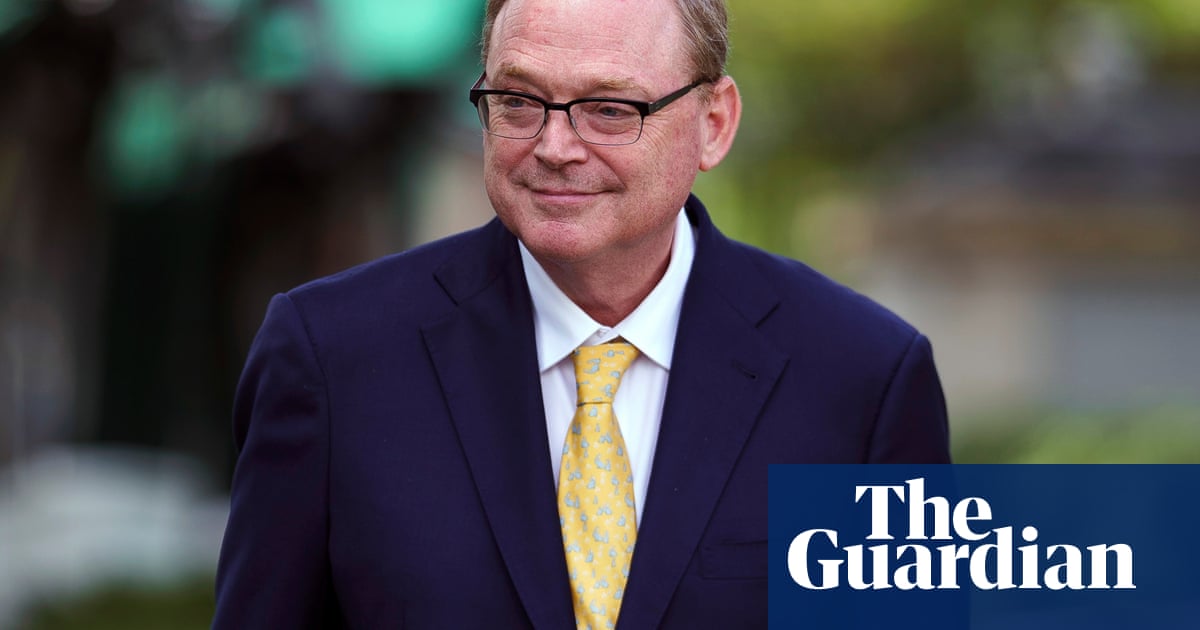


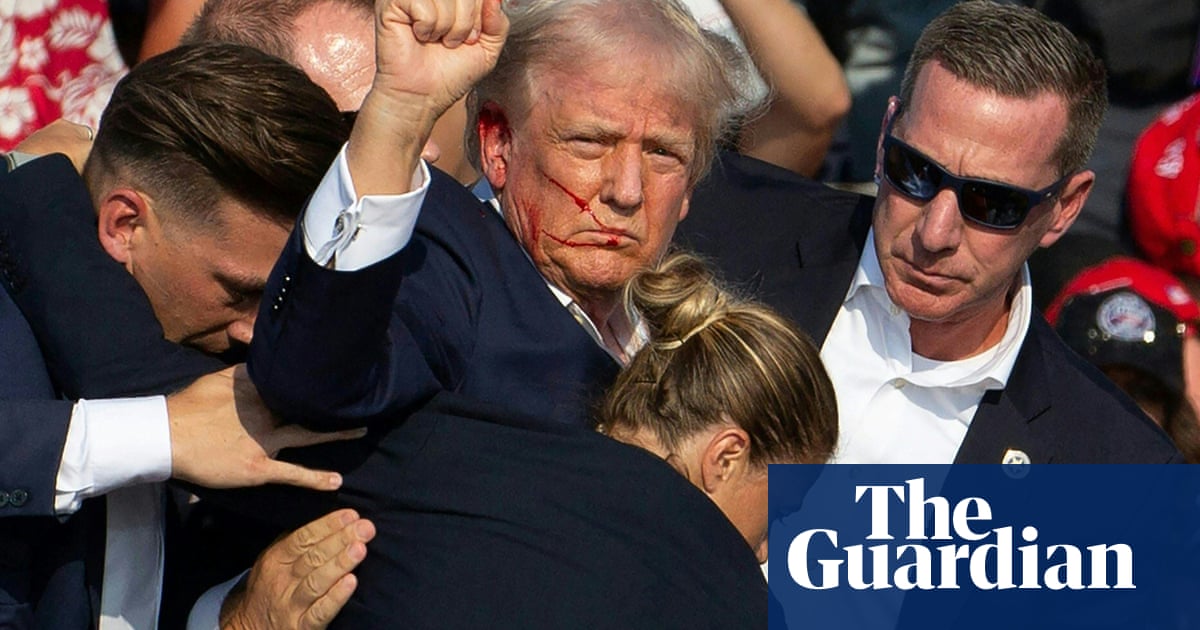




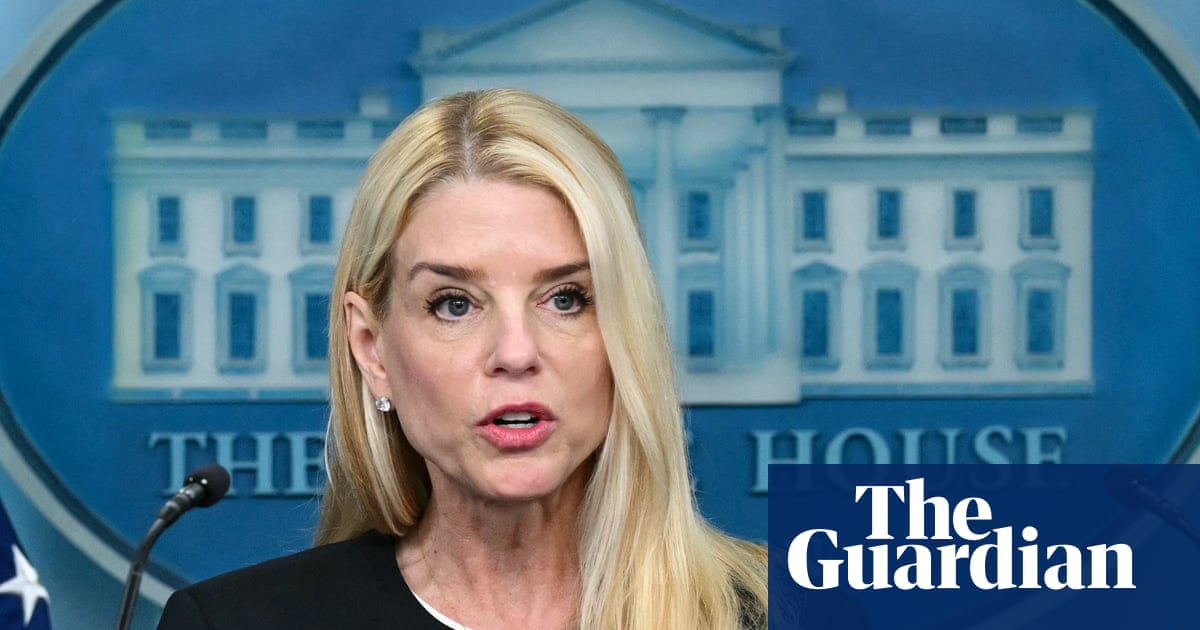






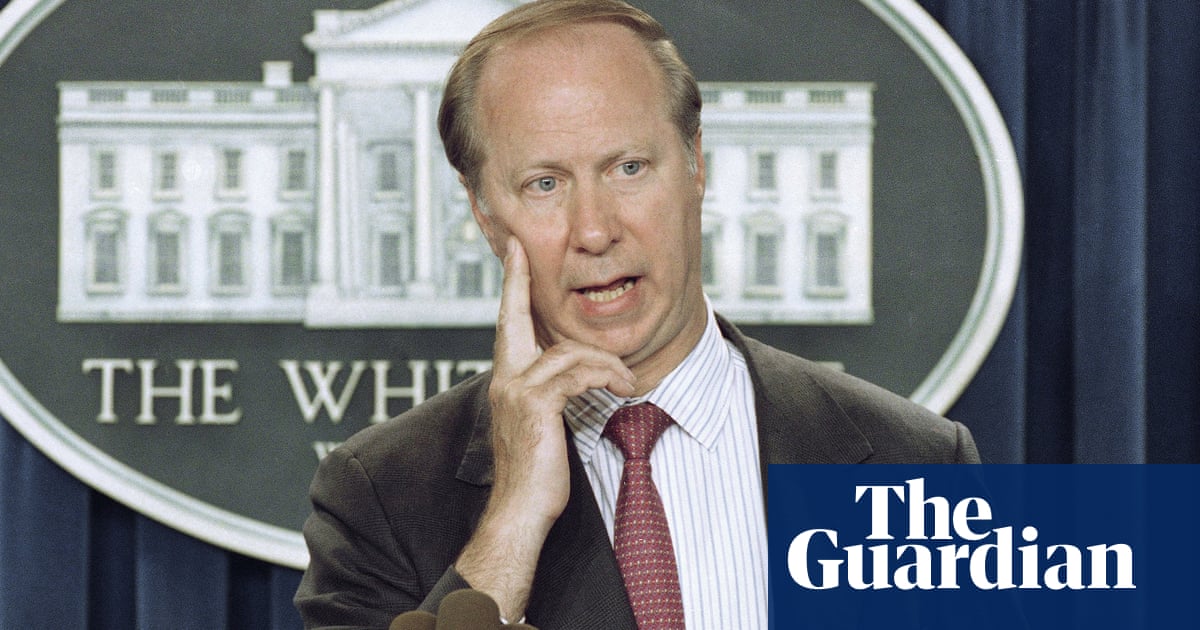






Comments